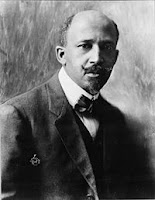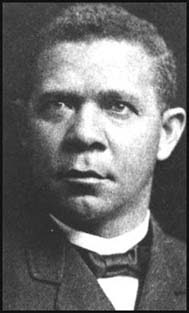a 21st century problem
“Herein lie buried many things which if read with patience may show the strange meaning of being black here in the dawning of the Twentieth Century. This meaning is not without interest to you, Gentle Reader; for the problem of the Twentieth Century is the problem of the color-line. “~W.E.B. Du Bois
I was browsing the discount stacks at a local Barnes and Noble a couple of days ago and scored a low-priced hardback version of W.E.B Dubois’  The Souls of Black Folk”. Being a grad of CAU, this was a book I had often heard about from many of my professors and fellow students, but never took or found the time to actually read. One of the best known quotes from the book is Dubois’ rather accurate assertion that: "The problem of the 20th century is the problem of the color line". Indeed a major theme of American culture from the Reconstruction era through the ‘80s and ‘90s was that of black people fighting to establish their identity as a race and to achieve equality in the political, educational, and economic arenas of this country. But now we’re well into the first decade of the 21st century, and while Don Imus and Jena are the most recent reminders that the American system is still far from perfect when it comes to treating its darker citizens as equal, it can no longer be argued that blacks don’t have access to almost all of the same opportunities as whites and other racial and ethnic groups.
The Souls of Black Folk”. Being a grad of CAU, this was a book I had often heard about from many of my professors and fellow students, but never took or found the time to actually read. One of the best known quotes from the book is Dubois’ rather accurate assertion that: "The problem of the 20th century is the problem of the color line". Indeed a major theme of American culture from the Reconstruction era through the ‘80s and ‘90s was that of black people fighting to establish their identity as a race and to achieve equality in the political, educational, and economic arenas of this country. But now we’re well into the first decade of the 21st century, and while Don Imus and Jena are the most recent reminders that the American system is still far from perfect when it comes to treating its darker citizens as equal, it can no longer be argued that blacks don’t have access to almost all of the same opportunities as whites and other racial and ethnic groups.
Yet – and maybe I’m just speaking for myself here – there is still this nagging feeling that with each of the individual gains reaped from integration, affirmative action and diversity initiatives, there has been a steep price paid by the black community as a whole. This morning as I listened to NPR during my get-ready-for-work routine, they aired a segment on what was termed a new kind of racial segregation – that being a division within the black community based on class. During the piece, Juan Williams relayed the results of a poll which highlighted that the values of middle / upper class blacks are more in line with those of whites in the same economic  stratum than they are with those of low-income blacks.
stratum than they are with those of low-income blacks.
As I listened, I immediately recalled a discussion I had during lunch with one of my mentors this past weekend. She and her family recently left Atlanta and took up residence on St. Simon’s Island, a rather exclusive community that’s almost completely white. As we talked, she shared her concerns that – though she loved her community – she was dismayed at the fact that her son had very little chance to interact with other black boys on a regular basis. He is the only black male in his elementary school and only one of three black children in the school overall. The closest mainland town that lies just on the other side of the bridge to St. Simon’s is Brunswick, where over half of the population is Black. However that same population is characterized by a 70% high school dropout rate, single-mother households, higher-than-average rates of disease, etc. Not surprisingly, she’s not enthralled that this is the only real-life image of other Black people her son has the opportunity to be readily exposed to.
Another oft-quoted term from Dubois is, "the talented tenth". Dubois strongly advocated the idea that a small group of college-educated blacks would be responsible for, “developing the best of this race that they may guide the Mass away from the contamination and death of the worst, in their own and other races". Dubois’ contemporary and ideological opponent, Booker T. Washington, asserted that blacks should first concern themselves with establishing financial strength and independence within their own community by developing practical skills and trades.
Mass away from the contamination and death of the worst, in their own and other races". Dubois’ contemporary and ideological opponent, Booker T. Washington, asserted that blacks should first concern themselves with establishing financial strength and independence within their own community by developing practical skills and trades.
It became clear to me as I continued listening to the NPR segment, that this nouveau segregation may very well be the natural (though unexpected?) side-effect of Dubois’ talented tenth paradigm. The sad irony, it seems, is that after decades of seeking the elusive American ‘promised land’, we may have arrived, but we’ve left so many of our kin behind that it looks almost exactly like the Egypt we fled. As I drove to work (where I’m usually the only black face I see in my many meetings), I was still pondering many of the questions sparked by the NPR piece:
Is the problem of the 21st century the problem of intra-racial segregation?
Is it really accurate to say that middle and upper class blacks don’t do enough to help black people on the lower end of the socioeconomic spectrum? And if it is, how can we do it in a way that amounts to more than just one-hit charity binges but affects long-lasting mindset changes?
Is it time for us to abandon Dubois’ talented tenth mentality and adopt a new approach?
(sigh) Where’s Booker T. when you need him?
cheers,
k
